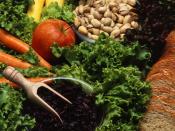Despite the daily deluge of health messages and warnings that Americans receive about their eating habits, a meal of hamburgers and French fries continues to rank as the top choice among diners. According to recent statistics from the U.S. Department of Agriculture, Americans "ate an average of 30 pounds per person of the crispy potato sticks in 1995" more than three times the amount ingested in 1965 ("Surprise," 1996, p. C3). Moreover, among patrons of restaurants and fast food eateries, "One out of five diners ordered a burger, for a total of 5.2 billion burgers" in 1995, claims the National Restaurant Association ("Surprise," 1996, p. C3). Americans might, therefore, find it difficult to believe that, in fact, "Most people throughout the world have eaten primarily vegetarian foods until recently. It is still the way that most of the world eats" (Ornish, 1982, p. 144).
Although most Americans clearly continue to relish their animal products and "junk foods," over 12.4
million of them, which amounts to nearly 7 percent of the population, now identify themselves as vegetarians, concluded a 1992 survey conducted by the research firm Yankelovich, Clancy, Shulman (as cited in Krizmanic, 1992). Thus vegetarians, until recently thought to be faddish, marginal, countercultural, or simply strange, have now become almost mainstream in America. The nutrition myths that used to prevail about vegetarians that they could not possibly get enough protein, calcium, iron, and vitamin B-12 from plant foods have been satisfactorily debunked, and a
vegetarian diet has achieved the status of a safe, wholesome, even normal, choice.
The vegetarian diet has been defined in a number of ways, but, for the purposes of this paper, vegetarianism means the custom of eating foods exclusively from plants and abstaining from all meat, fowl, fish and, for some, dairy products ("Vegetarianism," 2001). Lately, Americans have embraced a vegetarian diet for a variety of reasons: a commitment to ecological or environmental causes (4%), religious convictions and/or ethical principles (5%), the influence of family and friends (12%), and concerns about animal rights (15%) are among the popular motivations (Krizmanic, 1992). But those factors that have sparked the most compelling rationale for becoming vegetarian are the dangers associated with a meat-based diet; according to the Yankelovich study, 48 percent of those surveyed listed a concern about their health as "the single most important reason for becoming vegetarian" (as cited in Krizmanic, 1992, p. 74). Most of these survey participants chose a meat-free diet as a means to lowering cholesterol and losing weight (Krizmanic, 1992). But a vegetarian diet offers even more significant health benefits: recent studies have demonstrated that a plant-based diet has the power to reverseand possibly to preventcoronary heart disease.
Heart disease is the number one killer in industrialized nations. In fact, in 1996, 1,954,407 deaths occurred in this country due to cardiovascular diseases; more U.S. citizens died from heart disease than from cancer, accidents, and HIV combined ("Chronic Diseases," 2000). Twenty years ago, Dean Ornish, M.D., head of the Preventative Medicine Research Institute in Sausalito, California, recognized that conventional approaches to heart disease were failing miserably because they tended to offer only temporary relief: the symptoms were treated, but the causes of the disease remained unaddressed (Ornish, 1993). "With only drugs and surgery," Ornish argues, "the best we can hope for is symptomatic relief, a truce, a forestalling of further disease and death" (Ornish, 1982, p. 10). As described in his revolutionary book, Stress, Diet, and Your Heart, Ornish created his "Life Choice Program"a regimen that prescribes a low-fat, vegetarian diet combined with moderate exercise and stress reduction techniquesto combat the causes of heart disease (Ornish, 1982).
Dr. Ornish's was "the first randomized, controlled clinical study" that scientifically proved that even extreme cases of coronary heart disease can be reversed as a result of lifestyle changes exclusivelythat is, without the aid of cholesterol-lowering drugs or surgery (Ornish, 1993, p. 7). His study involved forty-six patients with documented cases of advanced heart disease. The patients were arbitrarily split into two groups: one followed Dr. Ornish's program for twenty-five days, and the other did not. According to Ornish (1993), "We demonstrated for the first time in 1977, and more conclusively in 1980, that these patients [who followed his program] experienced remarkable physical and emotional benefits in just a few weeks" (pp. 11-12). The patients who adhered to the program sustained a significant improvement in the performance of their hearts, an increase in their ability to exercise, and marked reductions in their weight, blood pressure, cholesterol, and susceptibility to emotional stress (Ornish, 1982). Even after six months, patients' incidence and severity of chest pains remained at a low level. These patients experienced secondary benefits as well: "In many patients, backaches, headaches, and other chronic pains also decreased. Many reported an increased sense of general well-being and a renewed feeling of being in control of their lives" (Ornish, 1982, p. 12).
The reasons for the health successes of a vegetarian diet are neither mysterious nor miraculous. The typical American diet is high in fat and cholesterol, elements that create a build-up of plaque in the coronary arteries, thereby reducing the flow of blood to the heart. When blood flow to the heart is impaired, the heart suffers from oxygen deprivation, which can lead to angina pectoris (chest pain or discomfort that results from heart disease) or, more radically, to a heart attack (Ornish, 1982). Animal protein is largely responsible for the chain of occurrences since it has a notoriously high fat and cholesterol content. On the other hand, Ornish declares, "Vegetable protein may actually reduce blood levels of cholesterol" (Ornish, 1982, p. 53), and he explains the reason for his theory:
"There is no cholesterol in fruit, vegetables, grains, beans, or any plant-based food. While fat is found in almost all foods, it is usually highest in those of animal origin. Also, most animal fat is saturated, while most vegetable fat...is unsaturated. Saturated fat tends to raise blood levels of cholesterol, while unsaturated fat tends to reduce it. (Ornish, 1982, p. 144)"
The ideal cholesterol level is between 150-160 mg/dLa level that is "practically only in people who have gone largely vegetarian"; when blood levels of cholesterol are under control, heart disease is kept at bay (Ornish, 1982, p. 146).
Dr. Ornish's assertions have recently been reinforced by numerous, completely unrelated studies. One study, for instance, examined the health of the residents of Biosphere 2the men and women who lived in a self-contained, dome-like world for two yearsbefore and after the experiment. These residents ate only what they could grow within the seven biomes, a diet consisting almost exclusively of grains, beans, bananas, papayas, greens and vegetables (with occasional indulgences in eggs, fish chicken, pork, goat meat and milk) (Laino, 1999). After two years, their team physician
made some remarkable discoveries:
"Over the course of their stay, the men lost an average of 18 percent of their total body weight; women 10 percent. Most of the weight loss occurred during the first six months of their stay. Average blood pressure decreased an average of 20 percent. And indicators for diabetesglucose, insulin, and glycated hemoglobindropped about 30 percent. Cholesterol was lowered from an
average of 193 to 123, and triglycerides also improved. (Laino, 1999, para. 7)"
Dr. Roy L. Walford, professor of pathology at UCLA, maintains that people could live much longer, healthier lives by imitating the eating habits of those who participated in the Biosphere 2 experiment (Laino, 1999).
Other unrelated studies corroborate Dr. Ornish's findings. For many years, researchers believed that the red wine consumed by the French helped lower the occurrence of heart disease throughout that nation. However, as researchers began to probe deeper, they discovered a nation dividednot by political ideologies or ethnic identities, but by eating habits and cardiovascular disease rates. While French citizens in the northern part of the nation drank wine, they also consumed quite a bit of meat and used butter and lard in cooking. As one would expect, the rate of heart disease among the northern French is high (Herman, 1997). In the South of France, the diet is more like that of Spain and Italy. The southern French consume meals that consist mainly of fruits, vegetables, winein moderationand vegetable oils. These citizens live much healthier lives with a greatly reduced risk of heart disease. Therefore, scientists have come to the conclusion that the consumption of red wine is only a part of the healthy-heart equation; eating a diet rich in fruits and vegetables is the most important variable in reducing the occurrence of cardiovascular disease throughout a given population (Herman, 1997). Claims such as these support Dean Ornish's prescriptions for a plant-based diet, and they reinforce the credibility of his program. But perhaps the most telling sign of the growing authority of his program is the response he is receiving from several major insurance companies. Insurance companies are infamous for refusing to pay for any treatments deemed "alternative," but several (Mutual of Omaha was the first) have begun to reimburse patients who are formally participating in Ornish's program (Ornish, 1995).
Clearly, a vegetarian diet provides Americans with a wise (and economical) way to fortify their health. By giving up animal protein, the health-conscious person can enjoy a wide range of benefits: a significant improvement in his or her heart's health; a decrease in weight, blood pressure, and cholesterol; a boost in physical stamina; a greater ability to process emotional stress; a diminishing of chronic aches and pains; and a pervasive sense of well-being. With regularity, scientists are discovering new ways in which a vegetarian diet can help people fight or prevent disease. For instance, research is beginning to suggest that a plant-based diet can alleviate the crippling pain of rheumatoid arthritis and migraines (Pelletier, 1998). In an even more provocative move, researchers are demonstrating that a vegetarian diet has the power to "shrink tumors, bolster immunity, counteract the toxicity of conventional [cancer] therapy and even reverse some cancers" (O'Connor, 1996, p. 57); in fact, a whole new branch of medicine, called nutritional oncology, has emerged as a result of these studies. The best part about the recognition of the link between food and health is that it is enormously empowering: people now know that they can, in fact, have some control over their health and, in so doing, they can exercise greater control over their lives.
References:
Chronic diseases and their risk factors. (2000, August 7). Centers for Disease Control.
Retrieved May 3, 2001, from http://www.cdc.gov/nccdphp/statbook/statbook.htm
Herman, R. (1997, May 6). France's great divide: Study finds sharp regional disparities in the nation's health. Washington Post, Z9. Retrieved May 3, 2001, from Newsbank online database.
Krizmanic, J. (1992, October). Here's who we are. Vegetarian Times, 72-80.
Laino, C. (1999, January 22). Eat lesslive longer. MSNBC. Retrieved May 11, 2001, from http://msnbc.com/news/ 2343047.asp
O'Connor, A. (1996, May). A nutritional war on cancer. Vegetarian Times, 56-65.
Ornish, D. (1982). Stress, diet, and your heart. New York: Holt, Rinehart & Winston.
Ornish, D. (1993). Eat more, weigh less. New York: Harper Collins.
Ornish, D. (1995, March). Healing the heart. Delicious! Magazine. Retrieved August 9,
1996, from http://www.newhope.com/pu/mar_95/ornish.guide.html
Pelletier, D. (1998, July 14). In pain? Try a change in diet. Stuart News. Retrieved
May 3, 2001, from Newsbank online database.
Surprise: Burgers, fries top America's menu. (1996, August 15). Tallahassee Democrat, p. C3.
Vegetarianism. (2001). Britannica Online, 1 screen. Retrieved May 1, 2001, from Encyclopaedia Britannica Online: http://www.britannica.com


